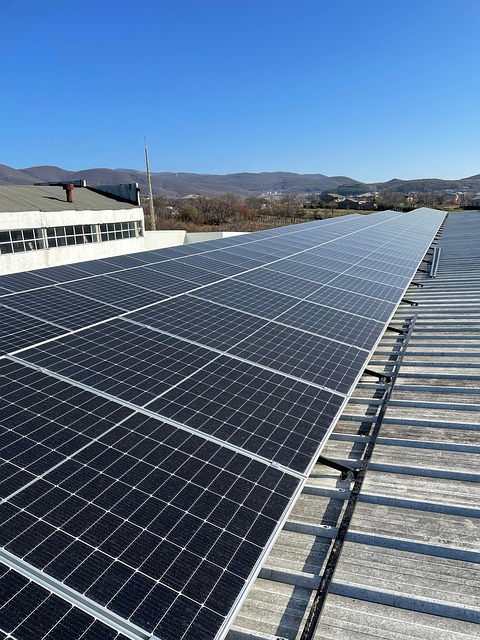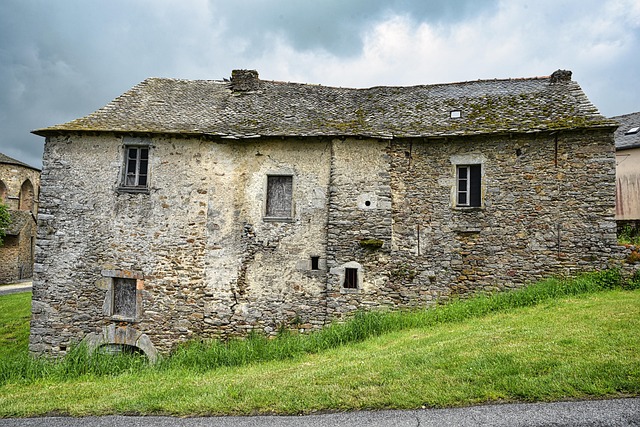Commercial roof installation involves selecting suitable roof types based on structural integrity, climate, business needs, and load requirements. Choosing the right roofer with experience in various commercial roofs, from flat to metal designs, is crucial. Proper material selection, project management, safety compliance, and post-installation care ensure robust, leak-resistant barriers that meet functional and visual criteria while enhancing building longevity and property value.
When businesses plan for construction or expansion, a new commercial roof is often a significant consideration. This comprehensive guide delves into the essential aspects of commercial roof installation, empowering business owners and managers to make informed decisions. From understanding unique installation needs to selecting durable materials and ensuring safety protocols, this article provides insights on every critical step. Learn how efficient project management and post-installation care contribute to a robust, long-lasting commercial roof.
- Understanding Commercial Roof Installation Needs
- Key Factors in Choosing a Roofer for Your Business
- The Impact of Material Selection on Roof Lifespan
- Efficient Project Management for Seamless Commercial Roof Expansion
- Ensuring Safety and Compliance During Installation
- Post-Installation Care: Maximizing Your Commercial Roof's Performance
Understanding Commercial Roof Installation Needs

When businesses plan for construction or expansion projects that involve a new roof, understanding the intricacies of commercial roof installation is paramount. This process goes beyond merely replacing or adding a covering to a building; it entails selecting the most suitable roof type for optimal structural integrity and longevity, while also considering local climate conditions and specific business needs. Commercial roofs must withstand varying weather patterns, heavy loads from mechanical equipment, and potential foot traffic, making material choices and construction techniques critical.
Several factors influence the decision-making process during a new roof install. Experts in roofing services provide guidance on different commercial roof types available, each offering unique advantages based on durability, cost-effectiveness, and aesthetic appeal. Whether it’s a flat roof, steep slope design, or something in between, the goal is to ensure a robust, leak-resistant barrier that aligns with both functional and visual requirements for the premises.
Key Factors in Choosing a Roofer for Your Business

When businesses look to construct or expand their facilities, one of the critical decisions they’ll make is choosing a roofer for their commercial roof installation. This isn’t a task to be taken lightly as the roof is not just an external feature but also a protective barrier against the elements, ensuring the safety and longevity of the building and its occupants.
Several key factors come into play here. First and foremost, consider the roofer’s experience and expertise in commercial roof types. Different buildings have different requirements, so understanding whether they specialize in flat roofs, metal roofing, or more complex designs is essential. Additionally, a reliable roofer should offer comprehensive services, including evaluating existing roofs for repairs or replacements, providing estimates, and ensuring compliance with local building codes during the new roof install process. Their ability to deliver high-quality workmanship using top-grade materials will guarantee a robust and durable roof that stands the test of time and harsh weather conditions.
The Impact of Material Selection on Roof Lifespan

When businesses look into commercial roof installation or expansion projects, one of the most critical factors influencing the longevity and performance of their new roof is material selection. Different roofing materials offer varying levels of durability, resistance to weather and environmental damage, and cost-effectiveness. Choosing the right material can extend the lifespan of a commercial roof significantly, reducing the need for frequent repairs or premature replacements. For instance, metal roofing has gained popularity due to its superior strength against heavy loads, excellent corrosion resistance, and ability to withstand extreme temperatures, making it a top choice for many commercial applications.
On the other hand, traditional options like asphalt shingles while cost-effective, often have shorter lifespans and may not hold up as well under heavy traffic or harsh weather conditions. Understanding the specific needs of the building, climate considerations, and budget constraints is essential when selecting materials. Engaging with experienced roof build services can help business owners make informed decisions that align with their project goals, ultimately ensuring a new roof that provides reliable protection for years to come during their commercial roof installation or expansion endeavors.
Efficient Project Management for Seamless Commercial Roof Expansion

When businesses decide to construct or expand their facilities, efficient project management is key to ensuring a seamless new commercial roof installation process. This involves careful planning and coordination throughout every stage, from initial assessments to final inspections. A well-managed project guarantees that the disruption to business operations is minimized, and the expansion timeline is adhered to.
Effective project managers oversee all aspects, including hiring qualified roofing professionals, selecting suitable commercial roof types based on structural requirements and climate considerations, and procuring high-quality materials. They also coordinate with various contractors and stakeholders to ensure everyone is aligned with the project’s goals and deadlines. This holistic approach results in a successful new roof install that enhances the building’s longevity and value.
Ensuring Safety and Compliance During Installation

When businesses decide to construct or expand their facilities, one of the most critical aspects is ensuring a safe and compliant commercial roof installation. This process requires careful consideration of various factors to meet both structural and safety standards. The last thing any business wants is a roof that poses risks to occupants or fails to protect against environmental elements.
During a new roof install, professionals must adhere to local building codes and regulations regarding commercial roof types. This includes using appropriate materials, ensuring proper drainage systems, and adhering to safety protocols for the workers. Roof build services should employ certified specialists who can provide detailed plans and inspections to guarantee compliance throughout the installation process. By prioritizing safety and following established guidelines, businesses can safeguard their investments and create a robust, long-lasting roof structure.
Post-Installation Care: Maximizing Your Commercial Roof's Performance

After a successful commercial roof installation, proper care is essential to ensure optimal performance and longevity. Regular maintenance checks are crucial, especially for flat or low-slope roofs commonly used in commercial settings. These inspections should include examining the roof’s overall condition, checking for any signs of damage or leaks, and ensuring drainage systems are clear and functional.
Proper post-installation care involves more than just regular maintenance. It also includes addressing issues promptly, such as replacing missing or damaged shingles or repairing seals. Using suitable cleaning methods to remove dirt, algae, or mold buildup can help maintain the roof’s integrity. Additionally, staying informed about local weather conditions and taking preventive measures during severe storms or harsh winters can significantly contribute to your commercial roof’s durability. These practices will not only extend the roof’s lifespan but also ensure your business remains protected from unexpected weather events.
